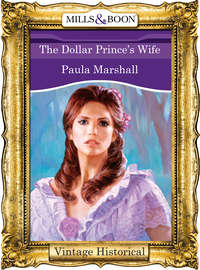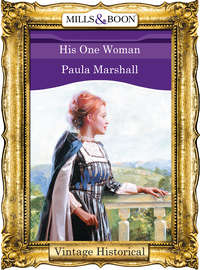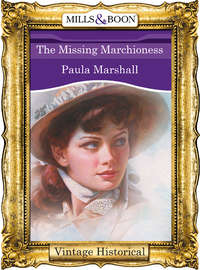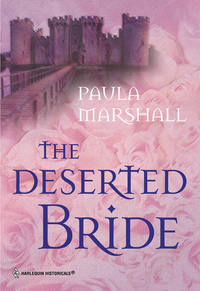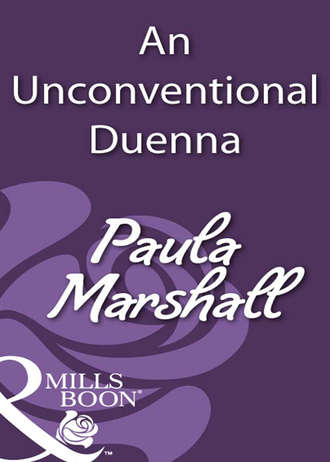
Полная версия
An Unconventional Duenna
“It is important,” she said quietly, “that I do not attempt to outshine my dear little Emma in any way, nor lead any gentleman to imagine that I am present in London in order to look for a husband, since I have no dowry. My duty is to look after her and give her the courage to enjoy herself in a crowded room. You must know how distressed she becomes whenever she is in a crowd.”
He had nodded mournfully at her. “Yes, I am well aware of why my wife has asked you to accompany us, but I cannot say that I quite approve of you being made to look twice your age.”
“That is part of the bargain to which I agreed,” said Athene, astonished at her own duplicity and at her ability to play the humble servant so successfully. “I beg of you not to trouble yourself on my account.”
“So be it, if that is what you wish,” he had said, and his wife’s entrance, towing along a reluctant Emma who was suffering from a severe case of stage-fright at the prospect of being among so many famous people, had put an end to the conversation.
Now, looking around the huge ballroom, aglow with light from a myriad of chandeliers beneath which splendidly dressed men and women talked, walked and danced, Athene felt like the man in the old story who said that the most amazing thing about the room in which he found himself was that he was in it.
Stationed as she was, standing behind the Tenisons, who were of course, all seated, she wondered distractedly how she was to begin her own campaign. It was going to be much more difficult than she had imagined. No doubt in his early days Napoleon Bonaparte himself must have had such thoughts, but look where he had ended up—as Emperor of France!
Well, her ambition was not so grand as his, and she would be but a poor thing if she made no efforts to attain it. Perhaps in the end it would all be a matter of luck, and occasionally giving luck a helping hand. Yes, that was it.
One thing, though, was plain. Tonight there was no lack of young and handsome men, many of whom were giving young girls like Emma bold and assessing looks—doubtless wondering how large their dowry was and whether they were worth pursuing. Thinking about dowries made her more than ever conscious that not only did she not possess one, but she also had the disadvantage of ignoble birth to overcome—if anyone ever found that out that she was illegitimate, that was.
To drive away these dreary thoughts she peered around the room from beneath her disfiguring cap, trying to discover if there was anyone present whom she might find worth pursuing.
There were a large number of men of all ages in uniform—was that where she ought to look for a possible husband, or should she try for one of the many beaux present? Perhaps an old beau might be more of an opportunity for her than a young one? The very thought made her shudder.
Emma looked over her shoulder at her and said plaintively, “I wish that you were sitting beside me, Athene. I should not feel quite so sick.”
“Nonsense,” said Mrs Tenison robustly. “You ought to be on your highest ropes at being here at all. Besides, I think that you may already have been found a partner. Cousin Exford expressly told me that he would introduce us to some suitable young men and here he comes with two splendid-looking fellows.”
Emma gave a small moan at this news. Athene, however, turned her grey eyes on the approaching Marquis of Exford and his companions to discover whether Mrs Tenison’s description of them was at all apt.
Well, one of them, at least, was splendid. He was quite the most beautiful and well-dressed specimen of manhood she had ever seen, being blond, tall and of excellent address. The young man with him, however, could scarcely be described as splendid-looking in any way: formidable was a better word. He was tall, but he was built like a bruiser—as Athene had already learned boxers were called. He was as dark as his friend was fair, his face was strong and harsh, rather than Adonis-like, and his hair and eyes were as black as night.
Indeed, Athene found herself murmuring, “Night and day.”
Mr Tenison overheard her and, turning his head a little in her direction, remarked in a voice equally low, “Acute as ever, my dear—but which is which?”
This cryptic remark would have set Athene thinking if the Marquis had not already begun his introductions when the Tenison party stood up. Athene, already standing, wondered what piece of etiquette was demanded from her which would acknowledge the superior social standing of the Marquis and his guests. A small bob of the head might suffice, so she duly, and immediately, bobbed.
The slow dance of formalities began. It appeared that the fair young man was Adrian Drummond, Lord Kinloch, from Argyll, and that his companion was Mr Nicholas Cameron of Strathdene Castle in Sutherland. Emma blushed and stammered at them. The lowly companion was introduced as an afterthought. Nick and Adrian had spent the early part of the evening discreetly inspecting those young women present whom they had not seen before. As usual they had found little to please them. Nick indeed had gone so far as to mutter to Adrian, “I don’t think much of the current crop of beauties if this is the cream of it.”
Adrian had replied dolefully, “Lord, yes. Mother is going to be disappointed again. Not one of them is a patch on Kitty.”
His cousin could not but agree with him, and when their mutual relative, the Marquis of Exford, had come up to them saying enthusiastically, “There’s a pretty little filly here tonight that I think you two rogues ought to meet. That is, if you’re both determined to marry, which Kinloch here says that you are,” Nick had groaned, “Let him speak for himself—I’m in no great hurry to acquire a leg-shackle.”
Exford smiled mockingly. “They’re taking bets in the clubs that both of you will be hooked by the Season’s end. If you really meant what you said, Cameron, I’ll lay a few pounds on you not being reeled in. Let me know if you change your mind.”
Nick was not sure that he cared for being the subject of gossip and bets made by bored and light-minded men. Adrian, however, had smirked a little, much as he was now doing at Emma.
“Charmed to make your acquaintance,” he was saying, and he was not being completely untruthful. She was after all one of the best of the poor crop which he had so far encountered, being blonde and pretty if a touch pale. He thought that if he married her, providing himself with an heir was not going to be too difficult a task. Exford had also told him on the way over that she had a useful, if not a grand, portion.
Not of course, that that mattered overmuch. Owning half of Scotland—only the Duke of Sutherland was richer than Adrian—meant that he was able to indulge his fancy where a bride was concerned.
Athene realised from Emma’s flutterings that she was finding this gorgeous specimen overwhelming: he was so different from the callow young men whom she had met at Assembly dances at home. When he bent down from his great height and said softly, “I am already claimed for the first few dances, Miss Tenison, but I should be enchanted if you would stand up with me in the quadrille,” she went an unlovely scarlet, looked frantically first at Athene and then at her beaming mama, before saying, “You do me too great an honour, Lord Kinloch.”
“Not at all,” he swiftly, and gallantly, replied. “It is you who are doing me the honour, Miss Tenison.”
At this, Emma blushed again and agreed to stand up with him. Satisfied, Adrian said, still gallant, “You will forgive me, I trust, if I leave you now. I must find my partner for the next dance. I shall be sure to visit you in good time for ours.”
Nick said to him when they strolled away to find their partners, “I thought that she was going to faint when you asked her to dance. Are you sure that you wish to pursue such a shy creep-mouse? I will allow that she is pretty enough for you, but she would not be my choice for a wife.”
“Oh, I like ’em shy,” said his cousin, “while you, you dog, like them talkative and striking—or in need of assistance in some way. I half-thought that you might have offered the companion a turn on the floor—it must be a great bore to stand up all night watching out for her charge.”
“You mean grey-eyed Pallas,” said Nick. “One can only just detect the colour of Miss Filmer’s eyes under that horrendous cap. She has a good figure, though, and by the cut of it she is not much older than her charge. Odd, that.”
“Pallas?” queried Adrian, puzzled. “I thought that Emma’s father said that her name was Athene.”
Nick laughed. It was patent that if Adrian had learned anything about the mythology of the ancient Greeks while he was at Oxford he had promptly forgotten it. “Athene was the goddess of wisdom in the ancient world,” he said, “and one of her names was grey-eyed Pallas. She had an owl as an attendant, too. I wonder if Miss Filmer sports one.”
“Should think not,” complained Adrian, “not much use at a ball, owls. Nor at the theatre, either,” he added as an afterthought. “You do come out with some weird things, Nick.”
Behind them Mrs Tenison was busily reproaching Emma for being so backward in welcoming Lord Kinloch’s advances.
“I wonder at you, child, I really do. A handsome young man of great fortune makes a fuss of you and all that you can do is blush and stutter. Here is your great chance. Be sure to talk to him if he chooses to talk to you, and if he wishes to meet you again then by all means accept any invitation he cares to make.”
“But I really do feel sick, Mama,” faltered Emma. “It is very hot in here—and he is so…so…”
She wanted to say that Adrian frightened her because he was like a prince in a fairy tale and surely he could not be interested in a country girl like herself.
Athene, listening to this, wondered why Mr Tenison did not defend his daughter a little. She thought wryly that if Lord Kinloch had asked her to dance with him she would have accepted his offer with alacrity—charming alacrity of course. While she felt sorry for Emma, she could not help feeling impatient with her. Now had the dark man, Nicholas Cameron, offered to stand up with her she could have understood her charge’s reluctance.
She had not liked the assessing way in which he had looked at them. He had even examined her carefully—not that he could tell what she really looked like beneath her appalling turn-out. Was it possible that this whole business was a great mistake? How in the world was she ever going to be able to charm anyone while standing like an ill-dressed scarecrow, mute behind her unkind patroness?
Emma said again, “I really do not feel very well, Mama,” to which her mother replied angrily, “Stuff, Miss Tenison, stuff!”
Mr Tenison put in a gentle oar. “Do you not think that you ought to take note of what our daughter is telling you, my dear?”
His wife turned on him angrily. “No, indeed, Mr Tenison. You ought to be aware of her whim-whams by now. It is time that she grew up. I do not hear Athene whining and wailing about her situation. If we give way to Emma every time she whimpers we might as well not have visited London at all.”
Mr Tenison subsided, and no wonder, thought Athene. He said not another word until Lord Kinloch returned with Nick in tow. He had cajoled him into offering the companion a turn on the floor. “I need to get to know the family better,” being the bait he had offered his cousin. “It would be as well to have the young dragon on my side.”
Nick had refrained from pointing out that judging by the dominant mother’s behaviour the whole family would be on his side if he began to court Emma so that there was no need to humour the companion. But for all his good looks and self-assurance Adrian was basically modest.
In any case the poet Burns had once written that “the best laid plans of mice and men gang aft agley”. Those of Adrian and Mrs Tenison certainly did. Adrian had scarcely had time to bow a welcome to Emma before she sprang to her feet, and face grey, fled from the ballroom, her hands over her mouth, wailing gently.
Mrs Tenison sprang to her feet also and charged after her. Athene was about to follow, but Mr Tenison now also standing exclaimed, “No!” with unusual firmness and held her back. “Her mother must care for her since it was she who has ignored her pleas for help.”
Adrian was completely nonplussed by this sudden turn of events which left him stranded on the edge of the ballroom floor, the centre of curious eyes. Nick had not yet had the opportunity to ask Miss Filmer to join him in the dance, nor was he to be allowed to do so.
With great address Mr Tenison sought to smooth over the unhappy situation created by Lord Kinloch’s sudden loss of his partner, by saying, “I am sure, Lord Kinloch, that you would wish to make up your set in the dance by taking Miss Filmer for your partner instead of Miss Emma. I am sure that my wife—and Emma—would prefer you not to be discommoded.”
To his great credit Adrian said, “But, sir, what of your daughter? I should not like to entertain myself while she is ailing.”
“She rarely suffers these turns, but when she does they soon pass,” he said dryly. “Athene, you would consent to partner Lord Kinloch, would you not?”
Would she not! Much though she regretted Emma’s sudden collapse, Athene could not help but be delighted by this opportunity to get to know a rich and handsome young peer, a true Lord of All. Adrian hesitated a moment before offering her his hand, and saying, “I would be grateful if you would oblige me, Miss Filmer.”
Her answer was to curtsey to him, bowing her head a little when she did so—at which juncture her over-large cap fell forward on to the floor at Adrian’s feet.
Deeply embarrassed, she had retrieved it and was about to resume it when Mr Tenison took it gently from her hand.
“Come, come, my dear, you do not need to take that disfiguring object with you into the dance for it to trouble Lord Kinloch with its misbehaviour. Is not that so, sir?”
Adrian did not hear him. He was too busy staring at the vision of beauty which was Athene Filmer now that she had lost her cap. She had, after entering the ballroom, visited one of the cloakrooms on a pretext and had loosened her hair from its painful and disfiguring bonds—which was why the cap had fitted so badly that it had come adrift. Even the horrid grey dress could not dim her loveliness. She reminded Adrian of the beautiful female statues he had seen on the Grand Tour which he had taken with Nick.
Nick was also staring at her. Grey-eyed Pallas, indeed, the very goddess herself. No owl, of course, but a pair of stern and dominant eyes which she was turning on the moonstruck Adrian above a subtle smile.
Now, what did that smile mean? Nick was a connoisseur of the human face. When he was in Italy he had come across an old folio containing drawings which purported to show that facial expressions almost invariably revealed the true thoughts and motives of those who assumed them. Experience had taught him that these very often slight indicators usually told him something important about those who displayed them.
He didn’t gamble very often—he considered it a fool’s pastime—but his ability to read the faces of those against whom he played gave him a marked advantage over them whenever he chose to. In the case of the one beautiful young woman whom he had hoped to make his wife he had ignored some revealing signs, only to discover later that they had told him correctly of her lack of virtue—thus adding to his suspicion of women’s motives.
So, what was the true meaning of Miss Athene Filmer’s smile? It was not at all the smile of a woman dumb-struck by Adrian’s physical beauty. Miss Emma Tenison—and many other women—had worn that smile, but not this particular woman. Unless he were mistaken, it resembled nothing less than that of someone who has achieved something important: it was the smile of a man who was winning a game of tennis, or that of an angler who was about to land a large fish.
Oh, she was a dangerous creature, was she not? A true beauty with her dark hair, her grey eyes and her glorious figure…And what the devil was he doing, standing there, drooling over such a fair deceiver, even if she were named after the goddess of wisdom herself?
He shook himself to restore his usual cold self-possession and began to pay attention to Mr Tenison, who was asking him to sit by him for a while since both of them were now abandoned while Adrian cavorted with Pallas Athene on the dance floor. Nick was only too ready to oblige him. He wanted to know more about this unlikely beauty. At first he and Mr Tenison spoke of general matters: the Season, the news from Spain, the wretched business of Luddism in the Midland counties.
It seemed that his family, and their companion, lived not far from Steepwood Abbey, where, if Nick were not mistaken, there had recently been yet another major scandal concerning its owner, the debauched Marquis of Sywell. He had taken some nobody for a wife—presumably no one else would have him—and the nobody had suddenly, and mysteriously, disappeared. It had even been suggested that Sywell had done away with her, which, considering his reputation, was a not unreasonable assumption.
Since nothing further had occurred, either in the lady’s reappearing, or Sywell or someone else being accused of disposing of her, the scandal had finally died down, and would only be revived if there were any further, exciting revelations.
“Are you acquainted with Sywell, sir?” Nick asked. “Is he such a monster as rumour says he is?”
“Worse,” said Mr Tenison briefly. “No, I am not acquainted with him—who is? I am at present, however, disputing some boundary lines with him. He has seen fit to enclose a large portion of my lands, not that he intends to do anything useful with it, of course, just to be a thorough nuisance to yet another of his neighbours.”
Nick nodded; so Sywell was the miserable scoundrel which the on dit said he was, and a bad neighbour into the bargain. He thought that now was the time for him to find out a little about Pallas Athene. So, while he was apparently idly watching her busily charming his cousin whenever they were joined in the dance, he said, “Your daughter’s companion seems strangely young for her post. They are usually middle-aged, or elderly, dragons. This one seems scarcely older than her charge.”
“Oh, yes,” said Mr Tenison, responding to this apparently reasonable statement. “As you have seen, my dear little Emma is of a nervous disposition. My wife thought that the usual stern creature we might hire would overwhelm her. Fortunately she was able to find someone sensible who would guard her and whom Emma would not be afraid of but would obey. Miss Filmer was a few years ahead of Emma at her school and protected her from those who sought to bully her because of her timidity. It also meant that she was doing Miss Filmer a kindness by giving her the opportunity to come to London for the Season, something her widowed mother could not otherwise afford.”
If Mr Tenison was crediting his wife with a benevolence which she did not possess, Nick was not to know that. He had, however, learned something useful. The poor girl from the provinces had been handed an unlooked-for opportunity to make the acquaintance of one of the United Kingdom’s richest young men. Hence, of course, the smile.
He might be doing her a wrong but he thought not. His instincts, finely honed over the years, told him that he was correct, particularly when Mr Tenison added innocently, “Miss Filmer is a most unusual girl, since she is not only beautiful, but remarkably clever, something which my dear Emma is not. We have had some interesting conversations in which she has shown an intellectual maturity far beyond her years. I consider that we are fortunate to have her as Emma’s companion—something of that must surely rub off on her.”
Nick, from the little he had seen of Miss Emma Tenison, sincerely doubted that! Mr Tenison’s revelations told him that Athene was well-named, but only time would reveal whether or not he was judging her too harshly in believing her to be husband-hunting for herself.
On the dance floor Athene was busy doing exactly what he thought that she was about.
At first she was pleasantly demure, but when Adrian said in his cheerful way, “I do hope that you are allowed to enjoy yourself a little, Miss Filmer. Standing around keeping an eye on that timid little thing must be dull work.”
“Oh, Mr Tenison has been extremely kind to me,” she ventured prettily. “Did he not ensure that I have not lacked for a partner tonight by recommending me to you? I trust that by doing so when Emma had her crise de nerfs just now he has not discommoded you.”
Adrian, who was not at all sure that he knew what a crise de nerfs was, and hoped that it was not catching, said artlessly, “Dear Miss Filmer, I was absolutely charmed by my first sight of you when you lost your ugly cap, and was delighted to have you for a partner instead of the mouse.”
Suddenly aware that in being so gallant to Athene he had impolitely slighted her charge, he added hastily, “Not that I meant anything wrong about Miss Emma, not at all…” He rapidly ran down, aware that anything he said might make matters worse.
“Oh, quite,” said Athene. “Poor little thing, it is quite an affliction with her. Crowds always seem to depress her.”
“But not you, I’ll be bound,” offered Adrian. The dance temporarily parting them, he spent the next few moments thinking up compliments which would not offend and congratulating himself on having found a real beauty. No chance of not being able to provide Clan Drummond with the wanted heir if he married, and bedded, her!
By the time the dance ended Athene had managed to convey that if Lord Kinloch was charmed by her, she was charmed by him. She had given him the address of the Tenisons’ town house after he had informed her that he wished to further their acquaintance. He was not so stupid as to be unaware that the only way in which he could see more of Athene was by showing an interest in the mouse.
Or perhaps he could persuade Nick to appear to pursue the mouse whilst he cultivated Athene. On second thoughts that was not a good idea. Nick would never agree to deceive a woman by pretending to admire her. He was too stupidly honest for that.
Nick, meanwhile, was further cultivating Mr Tenison by discussing with him Plato and his notions about morality, until Mrs Tenison returned, a somewhat recovered Emma in tow.
“A drink of water with a little brandy in it has restored the dear child,” she announced, before looking around her to discover that Athene and Lord Kinloch were both missing.
“Where in the world has Filmer disappeared to, Mr Tenison? I trust that she is not ailing, too. That would be the outside of enough. Emma needs her protection.”
Mr Tenison allowed apologetically that he had suggested that Lord Kinloch having lost his partner, he might still enjoy his dance if Miss Filmer acted as a substitute for Emma.
“Indeed,” said Mrs Tenison frostily. She looked at Nick and decided that he would not do as a partner for Emma. He was not a lord, and she had never heard of him. He was not on the list of eligible young men which she and her sponsor, Lady Dunlop, had drawn up between them.
Nick was saved by the return of Adrian and Pallas Athene from asking Emma, to whom he had offered his chair, to be his partner in the next dance. Athene, delighted that Lord Kinloch was so obviously taken by her, adopted a suitably demure manner when he gallantly insisted on handing her to a chair instead of restoring her to her usual humble station behind the Tenisons. She had no wish to offend Mrs Tenison more than was necessary. If she were to do so she might find herself sent back to Northampton.
That lady took one look at her radiant face—so different from Emma’s pale one—and barked at her, “Where is your cap, Filmer? What have you done with it?”
To Athene’s amusement, Adrian, wounded a little on his beauty’s behalf, said tactlessly, “It fell off, madam, because it did not fit Miss Filmer properly, and she is not a dull old thing who needs to wear something to hide her lack of looks!”


